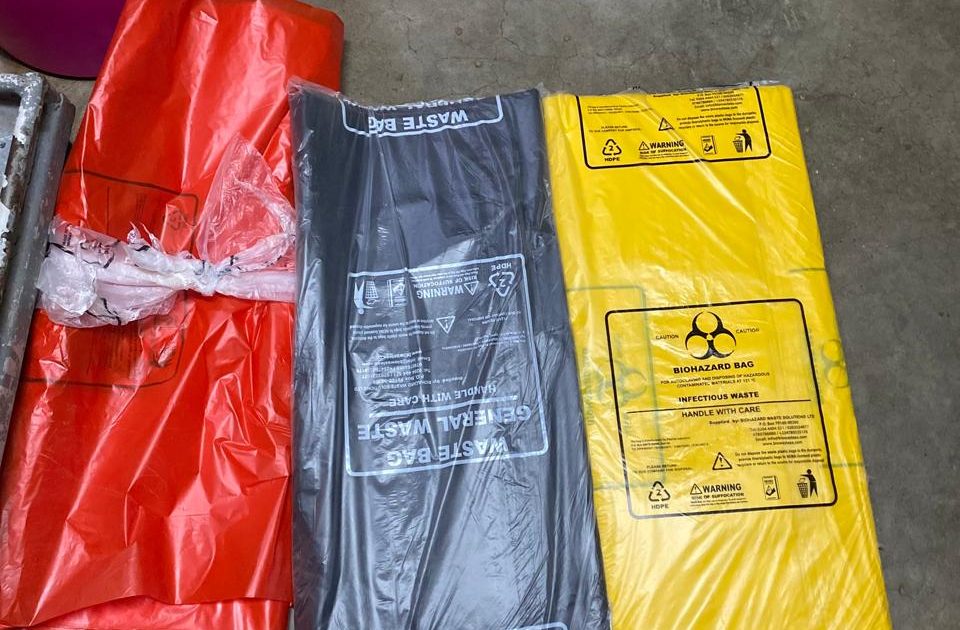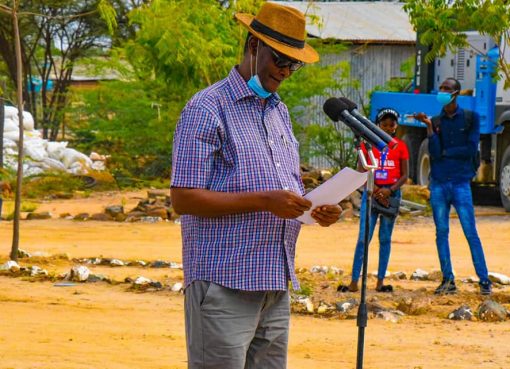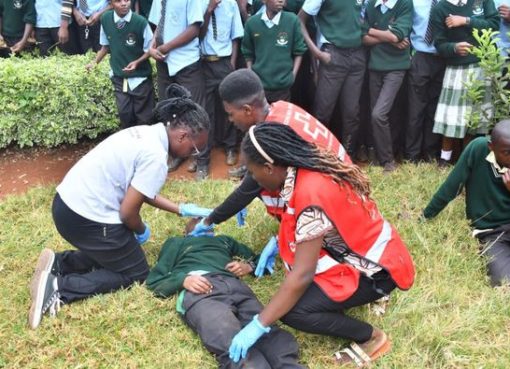In recent research done by the National Environmental Management Authority (NEMA), River Migori has suffered serious pollution as a result of toxic waste affluent being damped from tens of business entities and nearby health facilities.
A huge chunk of the waste (biomedical waste) always identified at the bank of the river is presumed to be from Ombo hospital located a few meters away from its bank and the local population is now restless and require the county government to intervene.
Biomedical waste, also known as infectious or biohazard waste, is any waste containing potentially infectious materials or biological agents. This waste includes infectious waste, pathological waste, sharps wastes (needles), expired pharmaceutical, chemical waste (laboratory reagents) and pressurized containers (gas-cylinders, gas-cartridges) Health facilities primarily generate this in large quantities.
According to Migori County NEMA Director Tom Togo, biomedical waste is mainly produced by health facilities, and if not properly managed, it can pose serious dangers to the environment and to the health of the local people.
Regrettably, most health facilities in Migori County are still struggling to meet the required standards for managing their wastes, adds Mr. Togo.
He says NEMA has been keenly enforcing the existing health regulations and norms, by compelling health institutions in the region to strictly adhere to procedures and the required standards to manage biomedical wastes by using specialized machines like microwaves and incinerators that are specifically used to completely burn the waste and control the amount of smoke emitted in the atmosphere.
However, Mr. Togo awards St. Joseph, Ombo Mission Hospital 75 percent marks on score-card noting that the institution is doing well in toxic waste management compared to other similar institutions in the area.
“Many of the local health facilities are encouraged to emulate St. Joseph, Ombo hospital to bench mark on what they should focus on to realise good waste management work, although the hospital itself still need to do much to score high,” he explained.
St. Joseph, Ombo Mission Hospital, situated within Migori town, stands as a prominent private healthcare institution, boasting a comprehensive range of medical services. It has delved massively into the intricate process of waste segregation, management and disposal within the hospital, with a specific focus on key departments such as laboratory, theatre, maternity and inpatient wards.
These areas are significant contributors to the overall waste generated within the hospital premises, as indicated by the hospital’s laboratory manager, Dr. Susan Amikoye.
“Waste materials are meticulously categorized into infectious, non-infectious and highly infectious wastes and, are subsequently allocated to yellow, black, and red bins, respectively.
Furthermore, a dedicated and secure receptacle is employed for sharp containers where waste is segregated to a certain mark and no one surpasses the mark. While paper and food waste are appropriately disposed of in the black bin, the red bin contains waste like amputated body parts and the yellow bin includes gauze and gloves,” said the medic.
“All staff members are trained in the proper procedures for sorting and managing waste and that the amount of waste generated depends on the number of patients admitted. No waste is recycled and the equipment in the microbiology department is sterilized,” explained Dr. Amokoye, adding that:
“It is paramount to note that our facility does not have an incinerator and we currently use the one at the county referral hospital to ensure that all hospital waste is completely incinerated.”
Dr. Amikoye explains that the hospital adheres to the guidelines and procedures set by the county government and NEMA in waste management, noting that their move to collaborate with other players on health matters such as Center for International Health, Education and Biosecurity (CIHEB) from University of Maryland has placed them a head of all other health facilities in the region.
CIHEB partners with the hospital on areas of trainings, provision of equipment and transport for disposal.
A registered nurse, at the maternity department, Benson Oguna, who explained into detail the process of waste management, emphasized the importance of safety, which includes using protective gear when handling waste and segregating placenta and amputated body parts before carefully disposing of them in designated pits.
“The decontamination process, which involves using three buckets containing disinfectant (jik) and soapy water for cleaning dressing packs. We also have designated sluice room for storing soiled linens soaked with blood and stool to ensure proper containment and management of potentially hazardous materials” said Oguna.
Biomedical waste poses a significant threat to public health when not properly managed. Improper disposal of such waste in rivers used by surrounding communities for various purposes can lead to the spread of serious diseases such as cholera and bilharzia.
All health facilities must give high priority to implementing comprehensive guidelines for the management of biomedical waste. Additionally, relevant authorities and agencies should establish and enforce effective procedures to enhance waste management practices
Public health officer George Okoth from Migori Referral Hospital explains how waste is managed in the hospital from highly infectious, non-infectious, and infectious waste placed in the red, black, and yellow bins, respectively to separate sharp objects, food, and body parts.
He emphasized the challenges they are facing, such as the insufficient size of the incinerator to handle the huge waste generated within the facility.
“The challenge we are facing today at the facility is the size of the incinerator which is too small to accommodate all the waste generated in the hospital but I would also like to appreciate the county government for providing us with a microwave that will soon make our work easier and we will be able to solve the issue of waste management,” said Okoth.
By Beryl Akinyi and George Agimba





